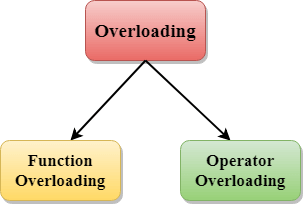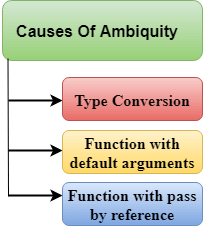C++ Overloading (Function and Operator)If we create two or more members having the same name but different in number or type of parameter, it is known as C++ overloading. In C++, we can overload:
It is because these members have parameters only. Types of overloading in C++ are:

C++ Function OverloadingFunction Overloading is defined as the process of having two or more function with the same name, but different in parameters is known as function overloading in C++. In function overloading, the function is redefined by using either different types of arguments or a different number of arguments. It is only through these differences compiler can differentiate between the functions. The advantage of Function overloading is that it increases the readability of the program because you don't need to use different names for the same action. C++ Function Overloading ExampleLet's see the simple example of function overloading where we are changing number of arguments of add() method. // program of function overloading when number of arguments vary. Output: 30 55 Let's see the simple example when the type of the arguments vary. // Program of function overloading with different types of arguments. Output: r1 is : 42 r2 is : 0.6 Function Overloading and AmbiguityWhen the compiler is unable to decide which function is to be invoked among the overloaded function, this situation is known as function overloading. When the compiler shows the ambiguity error, the compiler does not run the program. Causes of Function Overloading:

Let's see a simple example. The above example shows an error "call of overloaded 'fun(double)' is ambiguous". The fun(10) will call the first function. The fun(1.2) calls the second function according to our prediction. But, this does not refer to any function as in C++, all the floating point constants are treated as double not as a float. If we replace float to double, the program works. Therefore, this is a type conversion from float to double.
Let's see a simple example. The above example shows an error "call of overloaded 'fun(int)' is ambiguous". The fun(int a, int b=9) can be called in two ways: first is by calling the function with one argument, i.e., fun(12) and another way is calling the function with two arguments, i.e., fun(4,5). The fun(int i) function is invoked with one argument. Therefore, the compiler could not be able to select among fun(int i) and fun(int a,int b=9).
Let's see a simple example. The above example shows an error "call of overloaded 'fun(int&)' is ambiguous". The first function takes one integer argument and the second function takes a reference parameter as an argument. In this case, the compiler does not know which function is needed by the user as there is no syntactical difference between the fun(int) and fun(int &). C++ Operators OverloadingOperator overloading is a compile-time polymorphism in which the operator is overloaded to provide the special meaning to the user-defined data type. Operator overloading is used to overload or redefines most of the operators available in C++. It is used to perform the operation on the user-defined data type. For example, C++ provides the ability to add the variables of the user-defined data type that is applied to the built-in data types. The advantage of Operators overloading is to perform different operations on the same operand. Operator that cannot be overloaded are as follows:
Syntax of Operator OverloadingWhere the return type is the type of value returned by the function. class_name is the name of the class. operator op is an operator function where op is the operator being overloaded, and the operator is the keyword. Rules for Operator Overloading
C++ Operators Overloading ExampleLet's see the simple example of operator overloading in C++. In this example, void operator ++ () operator function is defined (inside Test class). // program to overload the unary operator ++. Output: The Count is: 10 Let's see a simple example of overloading the binary operators. // program to overload the binary operators. Output: The result of the addition of two objects is : 9
Next TopicC++ Function Overriding
|
 For Videos Join Our Youtube Channel: Join Now
For Videos Join Our Youtube Channel: Join Now
Feedback
- Send your Feedback to [email protected]
Help Others, Please Share









